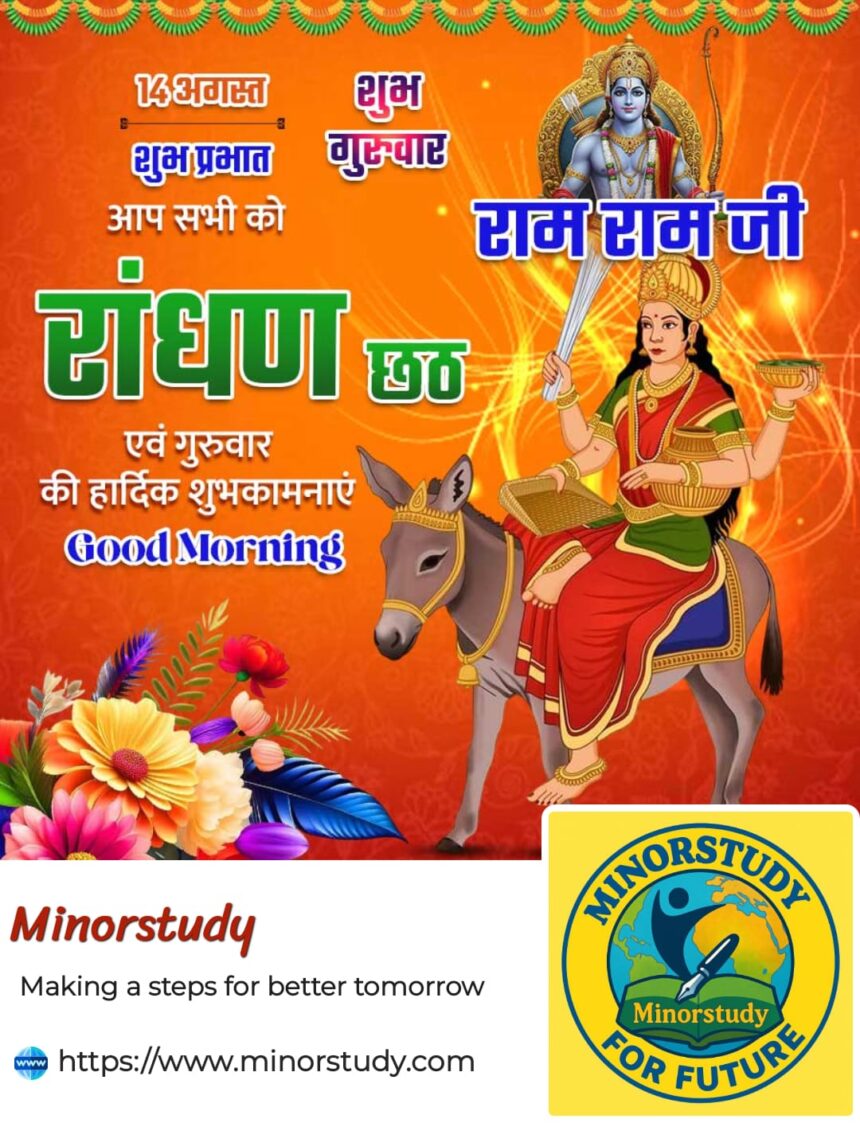Randhan Chhath — All You Need to Know
Randhan Chhath, also known as Baladeva Chhath or Balarama Jayanti, is a tender and meaningful festival steeped in Gujarati tradition. Observed on the sixth day (Shashthi) of Krishna Paksha in Shravan month, it serves as a preparation for Sheetala Satam, honoring Goddess Shitala Mata—the divine protector against ailments like smallpox and fevers. It also coincides with the birth anniversary of Lord Balarama, Krishna’s elder brother, symbolizing strength, nourishment, and agricultural prosperity.
1. History & Origin
Cultural Roots: Randhan Chhath takes place a day before Sheetala Satam, rooted in the belief that preparing food a day in advance—without fire—invites Goddess Shitala’s grace and protection.
Divine Connection: This day also commemorates Lord Balarama’s birthday, known as Baladeva Chhath. He represents strength, agriculture, and nourishment.
2. Timeline & Ritual Flow
| Phase | Details |
|---|---|
| When? | On Shravan’s Krishna Paksha Shashthi (usually July–August), marking the eve of Sheetala Satam. |
| Preparation Day (Randhan Chhath) | Women prepare all meals without lighting fire (no stove, cooker, or gas), anticipating the next day’s rituals. The cooked food is meant for consumption on Sheetala Satam. |
| Sheetala Satam (Next Day) | On the following day, food prepared is consumed cold. No cooking is done; devotees honor Goddess Shitala. |
| Balarama Jayanti Observance | Devotees perform puja, offer Panchamrita baths to Krishna and Balarama idols, and distribute bhog (prasad). Traditional attire and pure (satvik) meals underscore the sacredness. |
3. Interesting Facts
Literal Meaning: “Randhan Chhath” literally means “Cooking on the Sixth Day.”
Dual Essence: It seamlessly blends two observances—ritual preparation for Shitala Mata and celebrating Balarama’s birth.
Regional Variations: In Gujarat, depending on local customs, it may be observed during Shravan Shukla (bright half) or Vad (waning half) Shashthi.
Fire-free Tradition: The emphasis on not lighting fire symbolizes spiritual purity, discipline, and reverence toward the Goddess’s sanctity.
4. Significance & Societal Impact
Invoking Celestial Protection: Preparing food in advance is believed to bring the cool, healing grace of Goddess Shitala into homes.
Honoring Agriculture & Strength: Lord Balarama—the deity of the plough—symbolizes nourishment, resilience, and sustenance, reminding communities of their agrarian roots.
Passing Down Traditions: As families prepare together, values of devotion, memory, and cultural continuity are reinforced across generations.
Community Bonds: Planning and sharing rituals, stories, and prasad nurtures communal unity and emotional support.
5. Daily Life Impacts
Mindful Eating: The practice encourages planning and conscious consumption—eating cooling, pre-prepared food aligns with seasonal health care.
Women’s Central Role: Rituals place women at the heart of spiritual and household actions, highlighting their agency in cultural preservation.
Boosting Spiritual Awareness: In an age of fast-paced routines, such observances offer a sacred pause—inviting reflection on divine care and community wellbeing.
FAQs
Q1. What is Randhan Chhath?
A: It is a preparatory festival where fire-free meals are cooked in anticipation of Sheetala Satam—honoring Goddess Shitala’s blessings.
Q2. When is Randhan Chhath observed?
A: On the sixth day of Krishna Paksha in Shravan month (usually July–August).
Q3. Why not light fire on this day?
A: The absence of fire symbolizes purity and devotion, aligning with traditions of seeking protection and wellness.
Q4. How is it connected to Lord Balarama?
A: Randhan Chhath coincides with Baladeva Chhath—Lord Balarama’s birthday—celebrating his divine strength and connection to food and agriculture. https://www.oneindia.com/AstroSure
Q5. How do families celebrate?
A: The day involves cooking meals without fire, offering them lies cold on Sheetala Satam, performing pujas, and sharing prasad with loved ones.
Wishing Messages
“May Randhan Chhath fill your home with the serene blessings of Shitala Mata and the steadfast strength of Lord Balarama.”
“Wishing you purity, nourishment, and divine grace on Randhan Chhath.”
Conclusion
Randhan Chhath is not merely a ritualistic tradition—it’s a beautiful expression of devotion, purity, and cultural memory. As families unite to cook without fire and honor divinity through Balarama’s strength and Shitala’s healing, they nurture bonds that go beyond religion—embracing health, heritage, and hope.









I like studying and I conceive this website got some really useful stuff on it! .